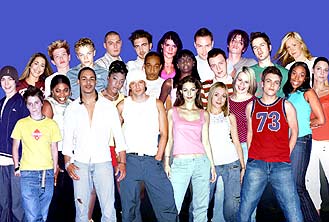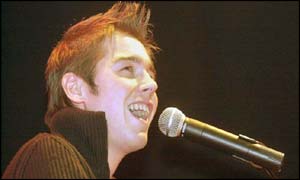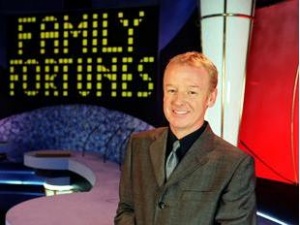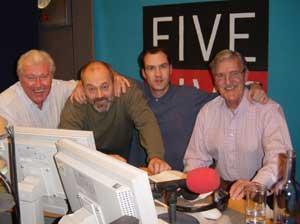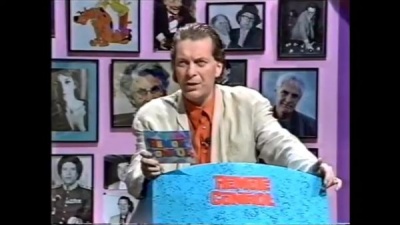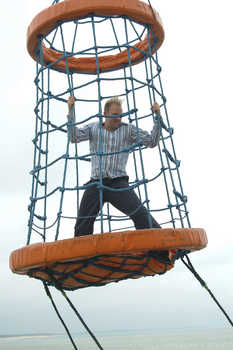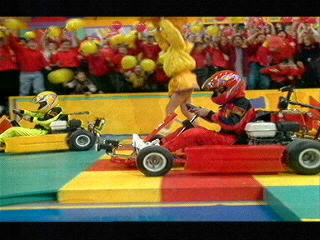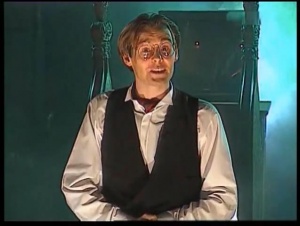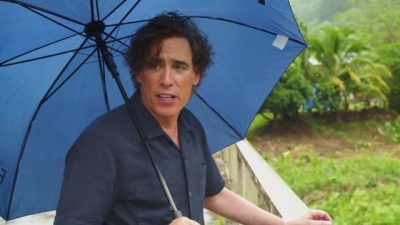Weaver's Week 2024-07-28
Last week | Weaver's Week Index | Next week
The ongoing campaign to count up all of the episodes of game shows, and work out which shows have made the most. A show needs 500 episodes to get in the list, or 100 primetime episodes, and we only count episodes aired before the end of 2023.
A fractious edition last time: Eggheads and Dragons' Den have been around forever, Double Your Money was around forever, and when we asked Does the Team Think? we had to reply "well, maybe, perhaps".
This time: the most famous sound effect ever, Jake Humphrey's big break, a 21st century radio show, and a Factory Records catalogue entry. But first, let's light the lights.
Contents |
The game shows with the most episodes (part 7 of a summer-long series)
Face the Music
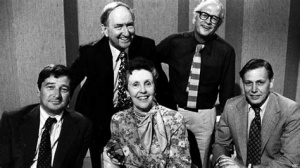 Joseph Cooper and producer Walter Todds tower above the panel: Robin Ray, Joyce Grenfell, David Attenborough. (BBC)
Joseph Cooper and producer Walter Todds tower above the panel: Robin Ray, Joyce Grenfell, David Attenborough. (BBC)
Three celebrities try and identify classical music pieces disguised in some way, and answer gentle questions about classical and band music. Most memorable for the Dummy Keyboard, where host Joseph Cooper played the rhythm on a piano that didn't work. Also pioneered a round where one opera was played while the teams saw visual footage of a different piece, which is basically one op to the tune of another.
Originated on radio as Call the Tune (36 primetime episodes, 1955-59). Ran in various mid-evening times on BBC2, mostly as a pleasant summer filler. Transferred to BBC1 for the last three series, one just scrapes in primetime on Sunday teatimes, and two in daytime. Across the two titles, we count 166 primetime episodes, and 180 episodes in total.
Fame Academy
Put a dozen or so aspiring youngsters in a house, expose them to top-quality musical tuition, have them perform on national television, remove one of the weakest performers each week, and whoever is the most popular person in the final week becomes the winner. Operacion Triunfo was huge in Spain, and Star Academy still does the business in France. Over here? Er, no.
It wasn't for want of trying. Fame Academy had massive wall-to-wall coverage across the BBC: performance shows on BBC1, nightly "updates" and "remixes" on BBC Choice, and twice-daily updates on CBBC. Following the precedent on Big Brother, we've said that one night's coverage on one channel counts as one broadcast, even if it was shown in two or three parts; the CBBC shows went out at breakfast and teatime, with different topics in both, and we must count them as two eps.
Fame Academy began in 2002 with live shows on Friday (hosts: Cat Deeley and Patrick Kielty), Fame Academy Live and ...Remixed on BBC Choice (hosted by Danann Breathnach and Vanessa Langford), and twice-daily reports into CBBC (Holly Willoughby and Jake Humphrey). Never mind the singers, that's a stellar line-up of hosts. (Even the Choice folk: Danann's moved into photography, taking headshots for actors; Vanessa is a "celebrity engagement manager" linking stars with charities.) Thanks to airing across lots of networks, this series made 102 prime-time shows and 100 additional episodes for the CBBC viewers.
 Carrie Grant outside the titular Academy. (Initial)
Carrie Grant outside the titular Academy. (Initial)
As the biggest entertainment show on the BBC, Comic Relief Does Fame Academy happened in 2003. The series had 17 primetime and 13 CBBC shows. Documentaries on series winners David Sneddon and Will Mellor went out over Easter, add another two primetime eps. Another doc, and a performance show from the tour, aired in July, ahead of the new series.
Fame Academy 2003 saw Claudia Winkleman move into the BBC3 host's chair. With the performances and nothing more airing on BBC1, we get 89 primetime and 105 CBBC shows, plus a "Story So Far" on the Red Button to fill an awkward gap in schedules. One primetime doc of the winner, and five CBBC shows drawn from the touring concerts. Fame Academy The Next Generation showed how they used the money from televoting, a daytime documentary.
The civilian series hasn't been recommissioned, and Alex Parks' career is only remembered by the most die-hard fans. Fame Academy continued with a Comic Relief version in 2005 (18 primetime and 8 CBBC shows). They made more of an effort in 2007 – spectacular presenters (notably Sarah Cawood and Dominic Wood on BBC3), 20 primetime and 16 CBBC episodes.
But when they announced the winner of Comic Relief Does Fame Academy 2007 at about 9.15 on the night, that was it. Fame Academy had closed, shuttered, gone for good. The money from the Fame Academy fund ran out about ten years later. We don't expect a recommission.
Add all these up and we get 251 primetime episodes, and exactly 500 episodes in total.
Family Fortunes
Eep-orp.
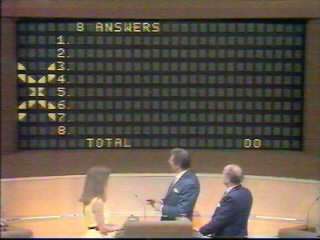
Two families, one huge game board, a famous host, questions with lots of possible answers, and the most famous game show sound effect of them all.
Originally imported to give Bob Monkhouse a reason to remain with ATV, then handed to Max Bygraves, Family Fortunes is most closely associated with Les Dennis. For years and years, Les would guide the competing families through their game, find the winner, and cheer them on to win the big money – and maybe even the car.
A daytime run in 2002 wasn't as good as the primetime show. Revived in the mid-aughts with celebrities and hosted by Vernon Kay, who was good but he wasn't Les Dennis. Revived again a few years ago with Gino D'Acampo, who is in the top five primetime hosts of this format.
We make it 515 primetime and 70 daytime civilian episodes, and 132 primetime editions commissioned in celebrity series. Some of the "civilian" episodes were played by celebrities, they usually made one or two celebrity specials each year for Christmas – they're slipped into the endless runs on the Challenge channel.
That's 647 primetime episodes, and 717 episodes overall. And the figure will grow, ITV have recorded even more episodes to go out when they have a hole in the schedule.
Fferm Ffactor, the Welsh-language farmer of the year competition, was huge on S4C in the early part of the last decade, and ran with celebrities for some years afterwards. We reckon 68 primetime episodes.
We covered Fifteen-to-One and Fifty/Fifty in the numbers section.
Fighting Talk
Four people who write about, broadcast on and participate in sport compete for points doled out by the host for saying something aggressive, interesting, or patriotic about a given sporting topic. Points are deducted for being dull, repetitive, unopinionated, or reading out facts cribbed from unreliable wikis like this one. The host has more sound effects than is sensible, and the show is a banging crashing loud hour of hot air and debate.
Johnny Vaughan established the show, Christian O'Connell proved it wasn't just a one-host wonder, and Colin Murray hosted the programme for 15 years. Including the TV pilot, and half-a-dozen Fighting Talk episodes about the news, we get a total of 835 episodes to the end of 2023.
Two children's shows called Finders Keepers have graced our screens. "Delta five"; Richard Stilgoe hosted computerised battleships in the early 80s, for 42 episodes. "Let's raid the room"; Neil Buchanan and Jeff Brazier had 93 episodes in the 90s and beyond.
First Class The Video Quiz made a star of Debbie Greenwood, Paperboy, and Hypersports. A very nice teatime show, 69 episodes.
Flash in the Pan was a food and drink quiz on the Carlton Food Network channel. Ran for about 18 months, which might just be enough to pass muster as primetime – but we don't have enough information to say it did.
Flying Start (1)
"As much a community institution as a TV show" – Manchester Evening News, 1997
"Inventors, entrepreneurs, and would-be tycoons from all over the North West have a chance to show their promise in a Granada series, Flying Start, which begins tonight at 6pm. Their ideas will be examined and tested and there are substantial cash prizes for the winners. Jobs will be created by the resulting new business projects." – Manchester Evening News, 1983
A beauty contest for small businesses – convince some successful businessmen that your company has potential, and you'll use a grant to grow the company and create jobs, and you could win a massive investment. Part of the thrill was watching the businessmen squirm under the questioning – one reviewer noted, "They couldn't look more uncomfortable if they were in a room with the Gestapo". At one point, Granada billed the top prize of £25,000 (now about £100,000) as televsion's biggest – allowed because it wasn't cash to an individual but an investment in society.
Richard and Judy hosted a couple of series, Brian Trueman was involved, but the show came into its own when hosted by Anthony H. Wilson. Yeah, the chap from Factory Records, and from Remote Control, was also a serious journalist and presented this social action programme. Much of the fun was Tony Wilson's commentary, praising the "craftsmen" and "skilled operators" of the North West, while describing "inferior" "cheap" foreign imports from faraway places like China, Brazil, or London.
Shown at 6.30 until 1989, usually at 7.30 afterwards, but the 1994 and most of the 1995 series went out in a late-night slot after prime-time ended. 123 prime time episodes, and 140 episodes in total.
Flying Start ended in July 1997 with no fanfare at all: as soon as the MEN called it a community institution, the show was gone. Its spirit lives on, the very successful Dragons' Den asks for really rich people to invest their own money, and Fortune: Million Pound Giveaway was a somewhat less long-running idea.
Hard lines to E4's Fool Around... . A single man moves into an apartment for a week with four women; one is single, the other three are in thus far stable relationships. The bachelor's task is to work out which one is single, and if he identifies her correctly at the end of the week, they split ten grand between them. If he doesn't, the lady who manages to fool him walks away with the cash. And the twist? The girls' Significant Others are in on it, watching in another room and helping their inamoratas in their schemes and scams. 99 primetime episodes in 2004 and 2005.
Another near miss: For Love or Money, a late 1950s quiz where successful contestants could either take the offered prize (which equates to "love", for some reason) or gamble on winning a sum of money ranging from nine shillings to 9999 shillings. 92 primetime episodes on ITV.
Fort Boyard is in, right? The French version of The Crystal Maze had versions on Channel 5 (54 episodes), the Challenge channel (20 competitions and 10 documentaries), and CITV (50 episodes). But the CITV eps were shown in children's hours, mostly premiering at 8am on weekend mornings or 5pm midweek, and we can't honestly class those as primetime. Total of 134 episodes, of which 84 primetime.
Four in a Bed
It's the Channel 4 daytime show. No, the other one. No, not that one with the clock, the one where bed and breakfast owners take turns to stay in one another's B&B, and pay what they consider fair for their stay after giving feedback. The winner is the establishment giving the best value for money. Each group consists of four B&B owners visiting each other, with a winner declared on Payment Friday.
The half-hour is filled with made-for-television entertainment: a meal, some sort of backstory, and contestants picking over each others' rooms looking for the snowy fir branch in an inaccessible place behind the wardrobe. After eating breakfast, questionnaires are filled out and money put in envelopes.
1058 episodes, of which 28 were primetime episodes.
More near misses. Four Rooms? 96 episodes of the collectibles-haggling show, still Jeff Salmon's best work. Four Weddings? 63 episodes of the competitive weddings show.
It's wacky! It's fun! It's cr-a-a-a-zy! It's outrageous! Fun House ran through the 1990s, gunging teams and making Pat Sharp look a plonker. Not that that's difficult. 145 episodes, and a classic start to the weekend.
Game for a Laugh broke the ground on Saturday night telly: we can trace a line straight through to Stephen Mulhern's In for a Penny. Just 60 primetime episodes.
Gambit, the pontoon-based game with Fred Dinenage, had 142 episodes. Not quite primetime, sadly, it usually went out in the 5.15 spot of family viewing.
Gamesmaster
A magazine show about computer games, with lots of challenges to prove that people could complete difficult challenges under pressure.
The show was groundbreaking from the get-go – we'd never had a television programme about video games, unless you count the annual World In Action episode "Billy Bug Gobbler Will Turn Your Children's Brains To Cake". Never mind that, thought Jane Hewland, look at how interested 11-year-old boys are for video games. That underground, rebellious, anti-establishment attitude was everywhere in the production – low budget, dark, smokey. The icing on the cake: the sharp wit and thinly-disguised innuendo of host Dominik Diamond.
Fondly remembered by anyone who was (or wanted to be) an 11-year-old boy in the 1990s, and much imitated – but we'll come to that next time. Gamesmaster ran from 1992 to 1998, with a regrettable revival in 2021. 129 primetime episodes.
Top show tables
Shows beginning with numbers, or A-Gamesmaster
Overall
| Show | Episodes |
| Countdown | 8732 |
| Bamboozle | 5900 |
| Big Brother | 4183 |
| Deal or No Deal | 3011 |
| Fifteen-to-One | 2683 |
| Come Dine with Me | 2432 |
| The Chase | 2247 |
| Eggheads | 2239 |
| Bargain Hunt | 2085 |
| The Big Quiz (1) | 2000 |
| Brain of Britain / What Do You Know | 1592 |
| Blockbusters | 1586 |
| 100% | 1546 |
| Brainteaser | 1200 |
| Four in a Bed | 1058 |
| Call My Bluff | 1047 |
| Dickinson's Real Deal | 1025 |
| Antiques Road Trip | 905 |
| Fighting Talk | 835 |
| Family Fortunes | 717 |
| The Brains Trust | 691 |
| Can't Cook, Won't Cook | 685 |
| Coach Trip | 630 |
| Catchphrase | 583 |
| Criss Cross Quiz | 508 |
| Fame Academy | 500 |
Four in a Bed slots in ahead of Call My Bluff, and Fighting Talk has already moved ahead of Family Fortunes.
Primetime shows
| Show | Episodes |
| Big Brother | 4173 |
| Family Fortunes | 647 |
| Call My Bluff | 542 |
| Catchphrase | 531 |
| Double Your Money | 470 |
| The Apprentice | 468 |
| Come Dancing | 431 |
| Blind Date | 416 |
| The Brains Trust | 416 |
| Britain's Got Talent | 383 |
| Bullseye | 369 |
| Blockbusters | 366 |
| Blankety Blank | 320 |
| Celebrity Juice | 271 |
| Dragons' Den | 269 |
| Big Break | 252 |
| Fame Academy | 251 |
| Dinner Date | 242 |
| 8 Out of 10 Cats | 232 |
| Ask the Family | 221 |
| Criss Cross Quiz | 220 |
| Celebrity Squares | 210 |
| What Do You Know? | 200 |
| Dancing on Ice | 189 |
| Artist of the Year | 175 |
| Face the Music | 166 |
| The Chase | 163 |
| Eggheads | 160 |
| 8 Out of 10 Cats Does Countdown | 157 |
| 3-2-1 | 154 |
| BBC New Comedy Award | 149 |
| Every Second Counts | 142 |
| Ant and Dec's Saturday Night Takeaway | 141 |
| Cardiff Singer of the World | 141 |
| Britain's Next Top Model | 138 |
| The $64,000 Question | 137 |
| Animal, Vegetable, Mineral | 131 |
| Gamesmaster | 129 |
| The Crystal Maze | 124 |
| Flying Start | 123 |
| Do I Not Know That? | 121 |
| Bob's Full House | 117 |
| Eurovision Song Contest | 112 |
| Ask Me Another | 109 |
| Busman's Holiday | 103 |
Fame Academy finished one episode short of Big Break. Patrick Kielty might make an unfortunate hand gesture.
And look how close it is between Gamesmaster and The Crystal Maze: all 90s culture is in that gap.
In other news
Mixed news for fans of shows where you've got to guess what's in your own briefcase, and perhaps swap it with someone else's. The Fortune Hotel will have another series on ITV. The broadcaster claims the series was "critically acclaimed"; as they say on another wiki, [citation needed]. The company also boasts about the 3.1 million peak viewers, without mentioning how all the other shows got about 20% fewer viewers. Nevertheless, Stephen Mangan has been given another paid holiday somewhere warm and wet, like central London.
Sadly, no news on the next series of Chase the Case with that nice Dan Walker.
Good news for fans of Olivia Attwood, she's flown eight young men to Greece to make a documentary about manhood and bromance. Except! Their girlfriends have arrived on another flight, and want to make a gentleman out of their bloke. Can the couples get back on track? Do they know what love is? Will Olivia be able to show them? Eliminations until we find the Most Improved Boyfriend at the end of Bad Boyfriends, made by Optomen, coming soon to ITV2.
Eisteddfod week means the final of Y Talwrn (Radio Cymru, Sun) and a local edition of Am Dro! (S4C, Sun). It's the final of Love Island (VM2 and ITV2, Mon)
Elsewhere, Battle in the Box continues (Dave, Tue, Wed), and Cooking With the Stars returns (ITV, Tue). Catsdown and I Literally Just Told You continue (C4, Fri), and of course Countdown is still on with The Great House Giveaway (C4, weekdays).
With sports filling BBC1 to breaking point, the Saturday night shows decamp to BBC4. This week, Noel's House Party from 1994, Larry Grayson's The Generation Game from 1981, Les Dawson hosts Blankety Blank from 1985, and Bob's Full House from 1988.
To have Weaver's Week emailed to you on publication day, receive our exclusive TV roundup of the game shows in the week ahead, and chat to other ukgameshows.com readers, sign up to our Google Group.

